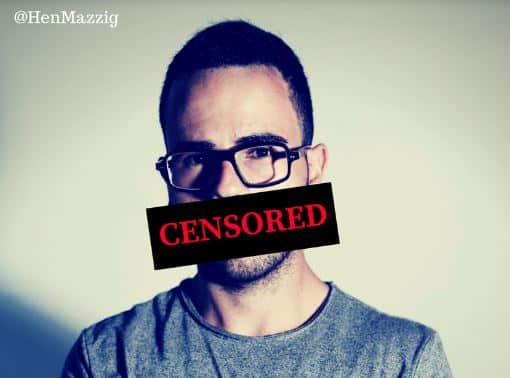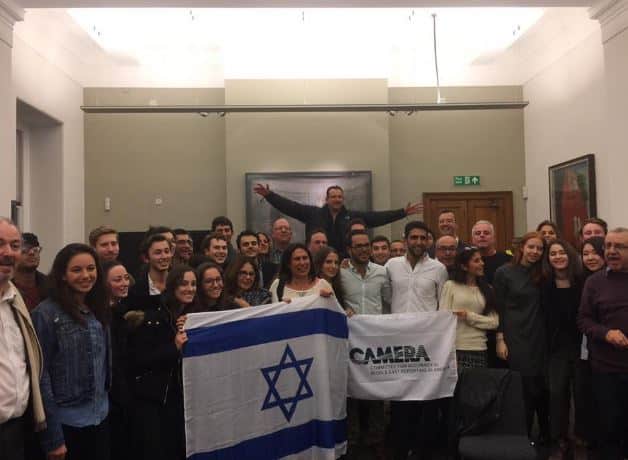They’re telling me to hide behind a wall in the lobby of a campus building – until they can safely bring me in.
The baroque clocks of University College London (UCL) have just ‘struck seven,’ and a CST security guard is frantically informing me that students are moving into another room – the third one this evening – since an angry mob have discovered the safe-space where we’re hiding.
Suddenly they get a phone call and I’m rushed into the classroom. I arrive at the new venue where a dozen students are standing in utter shock, petrified at witnessing scenes that no student should experience.
The student organizer, Liora, is telling me to stay inside. If the mob sees me, we will be penned in on all sides.
Suddenly, the campus police are shouting: “Everyone, get inside.” They run in panic and struggle to hold the doors closed. The mob has arrived: I hear the drums and the chants.
Soon enough, they encircle the room. They bang on windows; they smash against walls. They keep calling my name: “Hen, war criminal!”
Although it sounds like a scene from a Kafka story, this was just a simple speaking event arranged by Jewish students with CAMERA – a group committed to combating libels about the Jewish state at university campuses across the world.
England was my last stop on an international ‘speaking tour’ – and while my events in North America were a huge success, London proved to be different.
In 2014, I was invited to speak at Kings College London by the pro-Israeli student society. Hundreds of students protested against this event, demanding that the administration not allow me to visit the campus. I was libeled a ‘murderer,’ a ‘threat’ – and even an active participant in ‘massacres.’
The event took place, amid an intimidating disruption of students from the Palestinian Society who arranged a classic ‘walk-out’ stunt. As you can see in the video they published, I urged them to stay while they walked out of the room with taped mouths and poorly written signs, protesting me and my country for our very existence.
Having personally witnessed the enormous problems facing Jewish students in the UK, I thought I knew what to expect. During this year’s visit, I was supposed to be hosted at UCL – and once again, weeks before the event was due to take place, the student union was faced with massive pressure by the anti-Israel lobby. The UCL Union (UCLU) threateningly informed the society that the “speaker request for Hen Mazzig…on 27/10/16 has been rejected and you must cancel the event immediately.”
 Yes, days before the event, UCLU, the representative body for University College London students, demanded that the event be cancelled. An email to the students essentially dictated that they failed to disclose that I “was involved in a controversial incident at Kings in 2014” – implying that the nature of the prior incident disqualified me from speaking on campus.
Yes, days before the event, UCLU, the representative body for University College London students, demanded that the event be cancelled. An email to the students essentially dictated that they failed to disclose that I “was involved in a controversial incident at Kings in 2014” – implying that the nature of the prior incident disqualified me from speaking on campus.
The reasoning behind the email not only stifled free speech, it also rewarded the protesters of my past events. If activists make an event controversial, they can ensure that the speaker can never be invited back.
Shockingly, the UCLU took their flawed reasoning so seriously that it issued a threatening ultimatum to Jewish students: “If you fail to follow the actions as requested above, your society will face disciplinary action,” they declared.
The union even sought to implicitly threaten a non-Jewish student group, writing in an email that “It would be in your society’s best interests to disassociate yourself with this and encourage them to remove all details, including your society name as soon as possible.”
At a University founded by the great liberal Jeremy Bentham, it is quite ironic to see threats designed to shut down freedom of speech.
Thankfully, the university’s administration intervened after a complaint from the Jewish community – and our talk was permitted to go ahead.
But the calls to intimidate and shut down free speech didn’t cease. As soon as I landed on British soil, the anti-Israel lobby spread hysteria on social media.
Extremist groups such as the Khomenist front, ‘Friends of Al-Aqsa,’ incited a violent mob. Once again I was libeled a murderer, a genocidal war criminal and, again, a personal participant in massacres.
This is slander. I have never killed anyone in my life – my whole service sought to protect human life.
But these propagandists don’t care for the truth, and they don’t seem to have any moral pause about maligning innocent people.
 The time is about 7:30 PM and I am inside the classroom together with about 25 Jewish students – as well as several community members who came to show support to their kids.
The time is about 7:30 PM and I am inside the classroom together with about 25 Jewish students – as well as several community members who came to show support to their kids.
The noisy shouting from outside doesn’t stop – “Intifada Intifada!” Surrounded by hate, I start to recall when I was almost killed when I was 12 years old, during the Second Intifada. Traumatic memories are flooding back.
Amid the chants, four students then jump through the window. A young Jewish woman screams in terror. What was supposed to be a peaceful talk has now become profoundly threatening – invaded by a violent mob.
Security tells the invaders to back down and leave, but the mob refuses.
Young Jewish students are frightened, and I find myself hugging a female student who is experiencing a veritable panic attack.
I am frustrated. On the one hand I want to respond and push back at them. But for what good? It would have brought me down to their brutish level.
In my mind, I know that elements of the media will twist this experience – and contend that I, the speaker, was somehow at fault.
So I focus on calming the room – and keeping our restraint and dignity amid verbal assault and physical abuse. Finally, at 7:45PM, I begin my talk. The activists are furious – and shout even louder. “Intifada, Intifada, Intifada!” Hateful rap music is being played on a booming sound system. The police are outside; haplessly impotent. They’re simply watching on the sidelines.
I am determined to continue, to not let them stop me from speaking.
I relay my story: of my Mizrachi heritage and the Jews who were ethnically cleansed from the Arab Middle East. Indeed, the assault this evening brings to mind the Farhoud pogrom, the violent dispossession against the Jewish population of Baghdad, Iraq, my family, in 1941.
I don’t let the mob silence me and my family’s story.
I tell them of my humanitarian service in COGAT; how I survived a suicide bombing as a child; and, as a gay man, of my work with LGBTQ civil society in Israel.
I struggle to speak above the noise of the protesters – but more than ever, of the thousands of talks I’ve given across the world, I pour out my soul.
I finish my talk – and reassure the crowd that I would be glad to return. I will not be silenced – and they should not be silenced.
“We won tonight,” I tell them. I ask everyone to be proud of themselves and to stand tall. There isn’t a more admirable, more noble cause to support than Zionism, a movement that brought safety to the Jewish people who for centuries experienced oppression and humiliation as a minority across the world.
We all stand up – and we start singing Hatikva, ‘The Hope,’ Israel’s national anthem. We sing higher than the voices of the mob outside. At that moment, even in the face of violence, the music somehow gives us a sense of transcendent safety – and feel proud.
I am soon rushed out of the campus, in a police coat by the police. They keep telling me: “Don’t look back, keep running.” It is if I am escaping a warzone.
That night strengthened my resolve more than ever. The hateful mob reaffirmed my conviction that antisemitism remains alive – in Europe, North American and beyond.
In twenty-first century Britain, Jews leaving a room to screams of “Shame! Shame! Shame!” is utterly horrifying.
I couldn’t sleep all night – I kept on thinking, how do we fight such hate speech? The answer: with good speech.
You fight bigotry and fanaticism by standing tall, even when you’re afraid. We will continue spreading a message of hope – just as Israel does within the darkness of the Middle East.
 Hen Mazzig is a young, energetic, Israeli – a writer, international speaker, social media activist and advocate for his country. He shares his story with campuses and Jewish communities alike, speaking to thousands of people around the world. He tweets @HenMazzig.
Hen Mazzig is a young, energetic, Israeli – a writer, international speaker, social media activist and advocate for his country. He shares his story with campuses and Jewish communities alike, speaking to thousands of people around the world. He tweets @HenMazzig.




